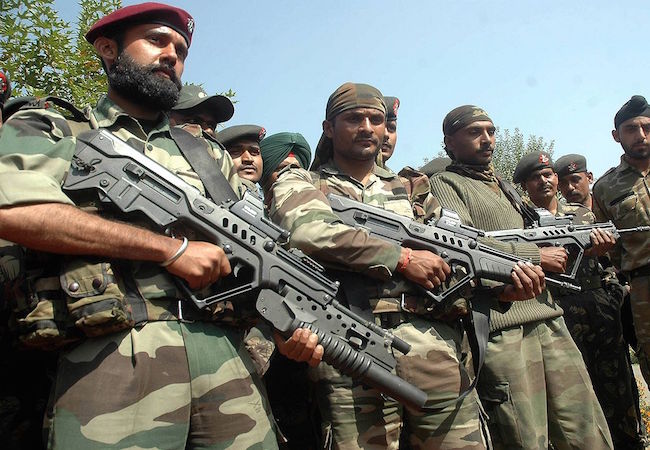India, Pakistan relations: ending terrorism, myths and blame game

By Usman Ali Khan
What does a country do when its neighbour’s entire reason to exist is to bring mayhem and destruction on this country? India’s terror tactics against Pakistan is just this. Lest we keep seeking peace when our soldiers are killed regularly; our cities bombed and hundreds of innocent lives are lost with every passing year.
While deceitfully accusing Pakistan of terrorism, Pakistan has long been a victim of terrorism. It is pertinent to understand before blaming Pakistan as the main sponsor of terrorism as amusingly done by Bruce Riedel, Pakistan has been shaken profoundly by a series of mass casualty terror attacks on its own citizens since from decades.
I wonder why Pakistan is in the news all over the world for all the wrong reasons ignoring what Pakistan has been doing in curbing this menace since 9/11. There have been numerous incidents in Pakistan like the one in Mumbai. For instance let’s take the Karachi airport incident for discussion. The recovery of Indian manufactured weapons from the site of the attack clearly indicates that the real problem is India which is manipulating the crisis in Pakistan.
In this blame game being played from both sides, the only loser is justice and truth.
Facts about the revelations regarding Mumbai attack made by the former Indian government official have not been highlighted in media. However, the silence was broken when a former Indian home ministry officer submitted his declaration in the Supreme Court of India which said that he was told by a former member of the CBI-SIT team that both the terror attacks (Parliament and Mumbai) were staged “with the objective of strengthening the counter-terror legislation. As Kasab and his accomplices were the creation of Indian intelligence. He had no Islamic inclinations or knowledge about jihad, could not recite the Holy Quran and was heard on video calling bhagwan for mercy.
Western assertions against India
Interestingly, Mr.Riedel is confused in picturing and maligning Pakistan’s role, that LeT is responsible for the Mumbai attacks by following the incongruous Indian narrative on the issue. Ironically, there is a lot that has yet to be surfaced about what happened in Mumbai. Reidel has not wholly understood the Indian role in creating this episode of Mumbai. Remembering a whistleblower, Satish Verma holding a major position in India’s Central Bureau of Investigation, has alleged his own government of orchestrating the attack on the Indian parliament, along with the 2008 Mumbai attack. Bearing in mind, Wikileaks has revealed a secret U.S. state department wire in which the U.S. had slammed New Delhi’s case on insufficient evidence.
Furthermore, the death of Hemant Karkare, who was investigating state-sponsored terrorism activities by RSS and Mossad, raised questions on the involvement of Indian agencies. With death threats against him already on record, why was ATS Chief Hemant Karkare left unprotected by the establishment on the streets of Mumbai? To let RSS and Mossad assassinate him? Gautam Adhikari warned that Karkare killing was a message by RSS and Mossad that you cannot investigate this angle.
Webster Griffin Tarpley, an American correspondent in a TV interview while responding to a question said, “The Research and Analysis Wing of Indian intelligence, they are up in Afghanistan, recruiting crazies from there to bring them down and help them to engage in terrorism inside Pakistan. So the Indians have this real dirty aspect.”
The Foreign Policy magazine also recently confirmed the Indians were neck deep in supporting the TTP in Pakistan:
While the U.S. media has frequently reported on Pakistani ties to jihadi elements launching attacks in Afghanistan, it has often ignored the fact that India supports insurgent forces attacking Pakistan. “The Indians are up to their necks in supporting the Taliban against the Pakistani government in Afghanistan and Pakistan,” a former intelligence official who served in both countries said. “The same anti-Pakistani forces in Afghanistan also shooting at American soldiers are getting support from India. India should close its diplomatic establishments in Afghanistan and get the Christ out of there.”
Afghan officials have also confirmed that India is using Afghanistan to stir trouble in Pakistan.
“India is using Afghan soil to destabilize Pakistan and Afghan security agencies are unable to stop Indian intervention due to absence of centralized government mechanism”, said Afghan Government’s Advisor, Ehsanullah Aryanzai on the sidelines of Pak-Afgan Parliamentary Jirga at a Pakistani hotel on April 2, 2009.
In this connection, one cannot ignore the observations made by renowned scholar Christine Fair of Rand Cooperation who said that “having visited the Indian mission in Zahedan, I can assure you they are not issuing visas as the main activity. Moreover, India has run operations from its mission in Mazar (through which it supported the Northern Alliance) and is doing so from the other consulates it has reopened in Jalalabad and Kandahar along the border. Indian officials have told me privately that they are pumping money into Balochistan.”
Rather than jumping to biased conclusions, Riedel should first scrutinize other sources of information to reinforce more realistic findings on the subject. Besides this, the Italian journalist Austro D Agnelli investigated the Indian involvement in terrorist activities and disclosed two permanent joint Indian air force and military bases, Farkhor and Ayni; both located in Tajikistan and used as terrorist training camps. According to the reports of Italian journalist, the members of Indian Secret Services at Farkhor Airbase and Ayni Airbase are recruiting underage unemployed youth from different underdeveloped and backward part of Uzbekistan and Tajikistan in garb of highly paid jobs. Handsome money around US $5000 is also paid to their families in advance for their young children recruitment.
In nut shell, from here on and in the backdrop of the Indian malicious designs, Pakistan’s efforts for peace in the region should not be considered its weakness.




